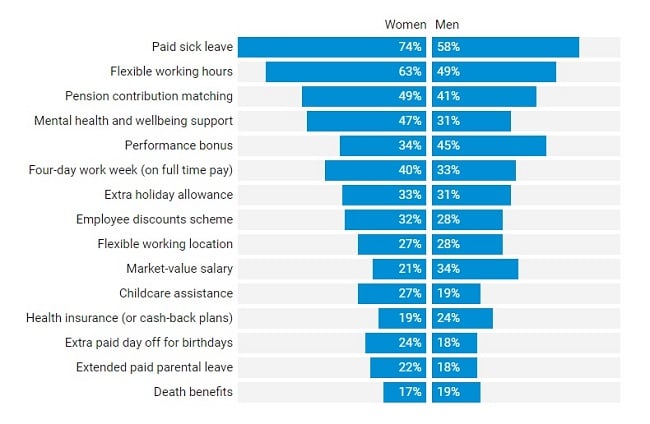Paid sick leave tops the list of benefits and incentives that matter most to British employees, according to new research by HR and payroll software provider Ciphr.
Perhaps unsurprisingly, after two years of pandemic-led disruption and rising living costs, among the most popular employee benefits are those which help supplement squeezed incomes, support people’s health, and encourage work-life balance.
For over two-thirds (67%) of the 1,001 people polled, sick pay is the employee benefit that they value most, followed by flexible working hours (57%) and pension contribution matching (46%) – where employers offer to match employees’ pension payments on top of the minimum auto-enrolment requirements.
Mental health and wellbeing support ranks fourth. Receiving a performance bonus and working a four-day week – enabling employees to earn the same wages for fewer hours – are in fifth and sixth place (selected by 40%, 39% and 37% of people respectively).
Next on the list, in seventh place, is extra holiday allowance, which, interestingly, was preferred by more people than unlimited paid leave (32% vs 18%).
Being able to save money on purchases via an employee discounts scheme (30%), having a flexible working location (27%), and receiving a market-value salary (26%) complete the employees’ top 10.
When it comes to employee benefits, every individual’s requirements and priorities differ, of course. And the order of importance varies depending on who is being asked. For workers over 45 years old, for example, getting their pension contributions matched (to help them build a bigger pension pot faster) appears to be more beneficial than being able to work flexible hours (59% vs 45%). For those under 45 years old, who are further away from retirement, it’s the opposite – with more people in this age group ranking flexible working hours higher than pension contribution matching (57% vs 42%).
There are also a few differences between what male and female survey respondents want from their employers’ benefits packages. Statistically, women place more importance on receiving help towards childcare assistance than a market-value salary (27% vs 21%). While more men, on average, favour being awarded a performance bonus over being paid a market-value salary (45% vs 34%).

Here’s a rundown of the top 15 benefits and perks for all employees:
1. Paid sick leave (67%)
2. Flexible working hours (57%)
3. Pension contribution matching (46%)
4. Mental health and wellbeing support (40%)
5. Performance bonus (39%)
6. Four-day work week on full-time pay (37%)
7. Extra holiday allowance (32%)
8. Employee discounts scheme (30%)
9. Flexible working location (27%)
10. Market-value salary (26%)
11. Childcare assistance (23%)
12. Health insurance or cash-back plans (21%)
12. Extra paid day off for birthdays (21%)
14. Extended paid parental leave (20%)
15. Death benefits (18%)
15. Unlimited paid leave (18%)
The full list – featuring the top 25 most important benefits and incentives to employees – is available to view at https://www.ciphr.com/survey-infographic-the-benefits-incentives-employees-value-most.
What do employers think?
Just because employees rate certain benefits highly, it doesn’t necessarily mean they are receiving them.
A report by the CIPD – the UK’s professional body for HR – into sick pay reform estimates that millions of workers are missing out on receiving even the minimum level of statutory sick pay (SSP) when they are too ill to work, due to earning too little (under £120 a week) to qualify for it or being self-employed. Although most UK employers do pay SSP, just 62% of the employers that the CIPD surveyed offer all their employees occupational sick pay (which pays more than SSP). This mirrors the findings of a previous Ciphr survey, which showed that 63% of organisations offer staff contractual sick pay (a further 64% reported providing mental health and wellbeing support to their employees).
To discover how closely employer’s opinions on benefits and incentives align with employees, Ciphr conducted a separate survey on the same topic to 332 British businesses.
When compared, the results highlight significant discrepancies between the benefits, perks and incentives that employers believe are the most important to their employees and what employees actually value the most. Overall, employers only ranked six of 25 benefits in the same order as employees – indicating perhaps that many organisations are not meeting employees’ benefits expectations and are missing opportunities to improve employee experience and engagement levels.
Paid sick leave, the top-ranking benefit chosen by employees, was only placed third by employers (mental health and wellbeing support and flexible working hours took their joint top spot). While pension contribution matching – the third most important benefit to employees – was way down the employer’s list of benefits that matter most, in tenth place.
The top 11 benefits that matter most to employees, according to employers (comparable rank in employee’s list):
- Mental health and wellbeing support (4)
- Flexible working hours (2)
- Paid sick leave (1)
- Flexible working location (9)
- Performance bonus (5)
- Four-day work week on full-time pay (6)
- Extra holiday allowance (7)
- Health insurance or cash-back plans (12)
- Childcare assistance (11)
- Pension contribution matching (3)
- Market-value salary (10)
Commenting on the results, Matt Russell, chief commercial officer at Ciphr, says: “It is surprising to see such a disconnect between the benefits that employees value and what employers think – especially given how important good rewards and benefits packages are to attracting and retaining top talent and for supporting a great employee experience.
“There is no one model or benefits scheme that works for every organisation. Employers need to spend time listening to their own employees to understand their needs and priorities and what benefits they want and value. For example, things like employee discounts, childcare assistance, and health or dental insurance, can go a long way to helping employees through the current cost-of-living crisis. And, what was once more important, pre-2020, has now been superseded by other benefits that reflect the growing shift to remote working and the desire for more flexibility at work.
“It won’t always be possible to deliver on every specific benefits request but organisations that can act on employee feedback, wherever possible, and provide agile and flexible benefits schemes are more likely to have a happier and engaged workforce.”
Ciphr polled a representative sample of 1,001 employed British adults and 332 employers to find out which benefits and incentives they consider to be the most important to employees. The results are available at https://www.ciphr.com/survey-infographic-the-benefits-incentives-employees-value-most.
More than 600 organisations use Ciphr’s cloud-based HR, learning, payroll and ATS recruitment software solutions globally across the public, private and non-profit sectors.
For more information, please visit www.ciphr.com.
###
Media enquiries:
Emma-Louise Jones, digital PR manager at Ciphr
e: ejones@ciphr.com
t: 01628 244206
David Richter, director of marketing at Ciphr
e: drichter@ciphr.com
Website: www.ciphr.com
Twitter: @CiphrHRSoftware
LinkedIn: www.linkedin.com/company/ciphr
Notes:
Ciphr polled 1,001 employed British adults between 24-25 February 2022. None of the survey respondents own or run the organisation that employs them. Nearly two-fifths (64%) of the people surveyed work at organisations which have 251+ employees, a quarter (26%) work at organisations that have 51 to 250 employees, and one in 10 (10%) work at organisations that have 26 to 50 employees.
Ciphr polled 332 British employers between 18-26 February 2022. Survey respondents hold the following job titles: owner or partner, CEO/president, CFO, director, or C-level executive. Over half (51%) of organisations surveyed have 251+ employees, a third (34%) have 51 to 250 employees, and one in seven (15%) have 26 to 50 employees.
Ciphr is a specialist provider of SaaS HR, payroll, recruitment and learning software through its HCM platform, Ciphr Connect. Ciphr’s cloud-based solutions help busy HR teams to streamline their processes across the entire employee lifecycle and spend more time working strategically.
Ciphr Connect enables seamless integration, not only with Ciphr’s own solutions but also to an ecosystem of specialist, third-party tools using its modern API technology.
Ciphr is a privately held company, headquartered in Marlow, Buckinghamshire. Over 200 employees work across the group, which includes Ciphr, Digits LMS and Payroll Business Solutions (PBS).
Ciphr Group spokespeople are available to provide expert media comment on a broad range of topics, including HR strategy, people management, employee experience and wellbeing, the future of work, tech trends, business and leadership, learning and development, and more.
